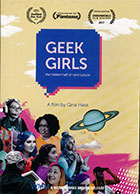
Geek Girls 2017
Distributed by Women Make Movies, 115 W. 29th Street, Suite 1200,New York, NY, 10001; 212-925-0606
Produced by Michael Massicotte
Directed by Gina Hara
DVD, color, 82 min.
College - General Adult
Feminism, Popular Culture
Date Entered: 05/15/2018
Reviewed by Brandon West, Social Sciences Librarian, State University of New York at GeneseoDirector Hara’s documentary explores what it means to be a female geek in a time when misogyny is commonplace within geek communities. Broadly defined, geeks or nerds are people that enjoy pop culture outlets such as comic books, video games, or Japanese anime. While geek culture has seen a spike in popularity and acceptance over the past decade, female geeks are often at risk of harassment when they participate in conventions (e.g., Comic Con), compete in online gaming communities, or “come out” as geeks at work. Hara interviews several women who identify as geeks in various ways, including the founder of the Black Girl Nerds blog, a NASA engineer, a convention cosplayer, and a video game designer. Each of these women speaks to a different dimension of being a nerdy female, and attest of the harassment they receive from males. On a disturbing note, Hara claims that she had trouble in recruiting women to interview as many did not want to receive online backlash for appearing in the film.
Given that females comprise 50% of the population, the problems highlighted in this documentary are certainly alarming; however, Hara does not explore solutions for how these issues can be addressed. In this regard, the documentary’s message seems a bit one-note. Hara briefly touches on the intersectionality of gender and race in geek communities, but the complexity of this concept is underserved. Despite these limitations, the film’s content is relevant to nerdy folks in time where geekdom and pop culture co-exist in a symbiotic state. This documentary is ideal for entry-level women & gender studies or sociology courses, since the feminist concepts embedded into the film have the potential fuel meaningful classroom discussions. Overall, Hara’s film excels in technical quality and delivers a meaningful message. These reasons make it is a great addition to library collections.